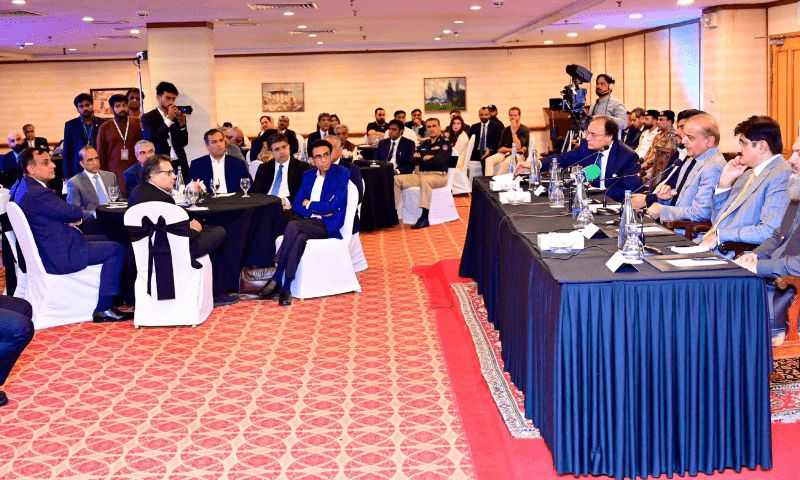PTBP Web Desk
The Cabinet Committee on State-Owned Enterprises (CCoSOEs), in a meeting chaired by Federal Minister for Finance Muhammad Aurangzeb, approved several key decisions to strengthen governance across major public entities. The meeting, held at the Finance Division, focused on restructuring the boards of critical state-owned enterprises (SOEs) and advancing the government’s SOE reform and management framework.
One of the central outcomes of the meeting was the approval of new nominations for the boards of three major energy sector companies — Pakistan State Oil Company Limited (PSO), Inter-State Gas Systems Limited (ISGSL), and Sui Southern Gas Company Limited (SSGCL).
The committee directed that all newly appointed government nominees must undergo mandatory corporate governance training within six months before formally assuming their responsibilities. This move aligns with the government’s broader objective of improving transparency, professional competency, and accountability in the governance of SOEs.
To ensure better management of public sector entities, the CCoSOEs established a high-level committee, chaired by the Minister for Petroleum, to review and finalize the categorisation of SOEs under the Petroleum Division. The committee will determine which enterprises are strategic, essential, or non-essential, in line with the SOEs (Ownership and Management) Policy, 2023.
This categorisation aims to streamline operations, eliminate redundancies, and align the performance of petroleum-related SOEs with the government’s long-term energy management strategy. The decision is also expected to facilitate better policy formulation for privatisation and operational restructuring.
For context, the SOE reform policy, adopted in 2023, mandates a clear framework for ownership, management, and accountability of public enterprises — an important step toward curbing inefficiencies that have historically burdened the national exchequer.
The meeting also reviewed and approved a summary from the Ministry of National Health Services, Regulations and Coordination concerning the appointment of independent directors to the Board of Jinnah Medical Complex & Research Centre (JMC&RC). The inclusion of independent members is aimed at enhancing institutional governance, operational oversight, and ensuring that the organisation’s management practices align with modern corporate principles.
Similarly, the Ministry of Commerce presented a summary for the reconstitution of the Board of Directors of the State Life Insurance Corporation of Pakistan (SLIC). The reconstitution seeks to strengthen corporate governance, promote professional management, and prepare SLIC for future privatisation prospects in alignment with the government’s economic revival plan.
A summary from the Ministry of Housing and Works was also considered and approved regarding the transition and dissolution plan for National Construction Limited and Pakistan Environmental Planning and Architectural Consultants (Private) Limited (PEPAC).
The approved plan outlines a framework for efficient winding-up of these two defunct entities, ensuring proper management of their remaining assets and responsibilities. The move is part of a broader effort to reduce administrative costs and streamline the number of state-owned bodies operating under federal ministries.
The Ministry of Industries and Production also secured approval for the reconstitution of the Board of Governors of the Pakistan Institute of Management (PIM) in Karachi. This decision seeks to upgrade managerial and professional training standards, helping professionals meet modern-day business and industrial challenges.
In addition, the Ministry of Information and Broadcasting presented a summary for the reconstitution of the Board of the Pakistan Television Corporation (PTVC). The reconstituted board aims to promote corporate discipline, financial transparency, and effective oversight of the national broadcaster’s management and programming decisions.
These changes are intended to bring PTVC’s operational model closer to public-service media standards while improving its financial independence and credibility.
The wide-ranging approvals reflect the government’s continued focus on revitalising Pakistan’s state-owned enterprises through better governance, transparency, and performance monitoring. Over the years, several SOEs have struggled with financial inefficiencies and weak management structures, leading to growing fiscal burdens.
By mandating corporate governance training, revising board structures, and categorising SOEs strategically, the government aims to create a system where public enterprises operate with commercial efficiency while maintaining social and strategic responsibilities.
This approach aligns with international best practices, as recommended by multilateral institutions such as the IMF and the World Bank, which have long emphasized the importance of corporate governance reforms for achieving fiscal stability and sustainable growth.
The meeting was attended by Federal Minister for Planning, Development and Special Initiatives Ahsan Iqbal, as well as senior secretaries and officials from relevant ministries and regulatory authorities.
The outcomes of the CCoSOEs meeting are expected to set the tone for future public sector reforms, particularly in energy, health, and industrial sectors, where the efficiency and governance of SOEs directly impact national development.
As Pakistan continues its structural reform agenda, such decisions represent a crucial step toward reducing financial losses, boosting institutional credibility, and strengthening economic governance.




